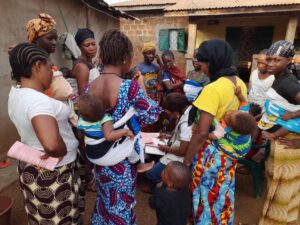Community, Youth, and Resilience
The Challenge
Current evidence indicates a strong relationship between the social and structural determinants of health and health resilience. However, the underlying mechanisms need to be better documented, and effective policies related to this relationship must be established. With increasing focus on the resilience of health systems, understanding these mechanisms will be crucial to developing programming that can foster health resilience at the individual and community levels to impact health and socioeconomic outcomes, particularly among youth. Youth represent an increasingly large proportion of the global population. Given the unique opportunities during the critical transition from childhood to adulthood, supporting youth resilience is integral to supporting health system and community resilience and overall youth health.

Our Work
Health Policy and Programming: Why Considerations of Social Capital, Resilience, and Health Matters
In this webcast, Susan Pietryzk and Athena Pantazis discuss the Accelerator’s exploration of social capital and resilience, covering definitions, measurement, and their potential impact on health systems. Molly Lauria highlights global social capital patterns, available data sets, and insights from a multi-country analysis. Athena then examines social capital’s link to health, sharing findings and data limitations from a South African study, and discusses practical applications in resilience and youth health programming from a Nigerian case study. Click here to view the webcast or watch below.
Examining Resilience of Youth Health-Seeking Behaviors and Socio-economic Outcomes to a Global Shock
Through a mixed-methods case study in Nigeria, the Accelerator investigated the healthcare utilization and socio-economic outcomes of youth in Nigeria during the acute phase of the COVID-19 pandemic and the program efforts and challenges to supporting youth resilience and retention in care during this shock.
Other Resources
- The Role of Social Capital in Improving Health Outcomes, Equity, and Resilience: A Quantitative Analysis
- The Role of Social Capital in Improving Health Outcomes, Equity, and Resilience: A Primer and Quantitative Analysis
- Multi-Country Analysis of Social Capital and Health: Building Evidence of the Positive Relationship in Low- and Middle-Income Countries
News & Resources
Un outil de plaidoyer axé sur le changement de comportement : Renforcer le dialogue citoyen pour un financement durable de la santé
Un outil de plaidoyer budgétaire innovant favorise l'engagement citoyen et...
Read MoreGuinea Hosts Technical Meeting on Enhancing Health Systems Through Social and Behavior Change Advocacy
To build more equitable health systems through social and behavior...
Read MoreAccelerator Contributes to USAID HSS Spotlight Brief Series
The Health Systems Strengthening Practice Spotlight series is an initiative...
Read More






